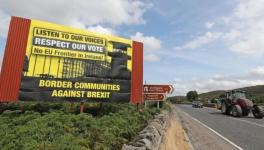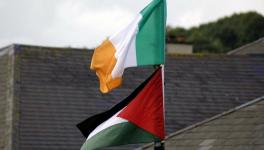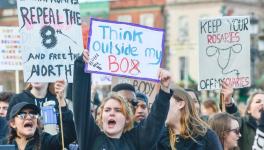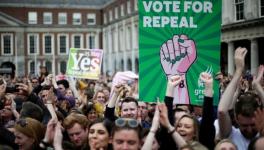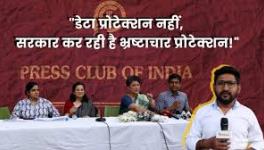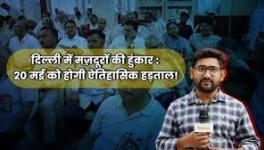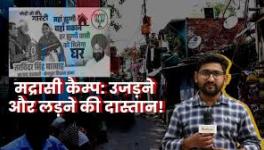Ireland’s Abortion Rights Victory was Through the Determination of an Organic Movement: Angela Coraccio
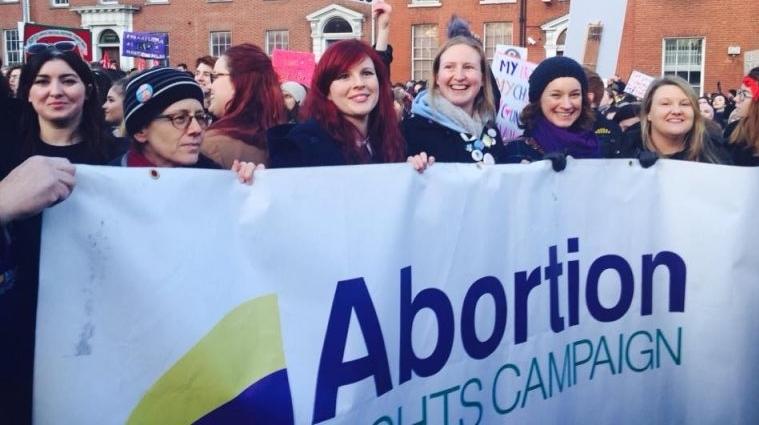
Image Coutesy: Abortion Rights IE/ Facebook
On May 25, abortion rights activists in Ireland won a huge victory in a referendum to repeal a law that bans abortion except in the case of a woman’s life being at risk. Nearly 66% of voters took a stand in favour of overturning the law. The overwhelming verdict was the result of years of patient organizing by a variety of groups. The Dawn News spoke to Angela Coraccio, Founding member of the Abortion Rights Campaign, on the campaign in the country.
How were the Abortion Rights Campaign and other groups able to effect a change in the mindset of the people on the issue of abortion, especially in the context of Ireland being a largely Catholic country?
When the Abortion Rights Campaign started over five years ago, one of our first main objectives was to fight the stigma around abortion and the culture of shame and silencing around women’s reproductive lives generally. The best way to end stigma is to start telling personal stories. But this is obviously very difficult when the stigma is such an ingrained part of the culture. So we started off small, with private events called ‘Speak Outs’, which created a safe space for women to tell their abortion stories. From there, we started engaging with spaces where abortions stories could be told publicly but anonymously online, and then there were people who very bravely spoke in public about their experiences, despite facing a lot of backlash including threats to their personal safety. In particular, members of the group Terminations for Medical Reasons (TFMR) have been extremely vocal and public of the horrors they have faced with having fatal foetal abnormalities and needing to travel to another jurisdiction to receive treatment. They are truly heartbreaking stories which really changed the narrative around abortion care.
But generally, as a campaign, the Abortion Rights Campaign is not anti-Catholic at all. In fact, we have been very inspired by the American group Catholics for Choice, which talks a lot about how being pro-choice doesn’t have to conflict with Catholic beliefs.
But really, the way we changed the mindset was by talking about the real harm that the abortion ban created, particularly in the past 35 years since the 8th Amendment was inserted into the Constitution (abortion was illegal before that). The 8th Amendment was not simply a ban on abortion; it created a situation where a pregnant person did not have the same rights to consent as a person who isn’t pregnant. For example, if you are not pregnant and you have a heart condition and the doctor recommends surgery, you have a right to refuse. If you are pregnant and a doctor feels you should have medical treatment, you can be taken to court and forced to undergo treatment against your wishes. Conversely, if you are ill, such as women who discover they have cancer while pregnant, you will likely be refused treatment such as chemotherapy on the basis that it will harm the foetus. This happened to a woman named Michelle Harte who was refused an abortion and had to stop taking her cancer medication. She died from cancer and her baby also did not survive.
What were the day-to-day events or actions carried out by you in spreading the message and appealing to the people to vote YES? How were the big protests and demonstrations organized?
We have a strong social media presence which we have been building for the past five years. Our main national accounts currently have about 27,000 followers on Facebook and 23,700 followers on Twitter. But in addition to that, we have worked very hard to form regional groups all around the country that have their events and social media. One of our main tactics was to ensure that we form groups of active members all over the island, north and south of the border.
In September, we will have our seventh annual March for Choice in Dublin. We had our first March for Choice only a few weeks before Savita Halappanavar tragically died in Galway as a result of being refused abortion care. Each year, the March for Choice grows in size – last year, we had more than 40,000 in attendance. We think of it as both a place to celebrate being pro-choice and come together to show our shared values for reproductive justice, but also as a protest to the current laws. Each year, the march has its own theme to highlight our main objectives in that point in time. Last year’s theme was ‘Time to Act!’ which was both a message to politicians but also to our supporters, to motivate them into agitating for change. While our campaign is worldwide, it’s important to us that we all come together in Dublin at least once a year to show our strength in numbers. So we do our best to facilitate buses from all around the country to travel to the capital city on the day.
What kind of impact did the death of Savita have on the mindset of the people with respect to abortion rights?
There’s no denying that Savita’s death was a pivotal turning point in the narrative around abortion as healthcare. This was a wanted pregnancy which ended in miscarriage. In other countries, it would have been standard procedure, particularly when she started to show signs of infection. However, in Ireland, even if the pregnancy is not viable and miscarriage is imminent, nothing can be done while there is still a foetal heartbeat. For many people, the idea that a woman can be allowed to die over a doomed pregnancy was incomprehensible and nonsensical. It changed some of the perceptions and assumptions about who needs abortion care and under what circumstances.
Additionally, people really seemed to grasp the idea that had Savita been in nearly any other European country when she miscarried, she would still be alive today.
How did the political parties respond to the campaign and which are the parties supporting and opposing it now?
There has been a real sea change in the political landscape since ARC started campaigning for abortion laws to change in Ireland. Fine Gael, the party currently in power, was ardently anti-choice when they first came to power in 2011. Yet they ended up being the party that put forward the referendum and actively campaigned for a yes vote. Their evolution has been a really interesting one. Under pressure to act on the issue, they initially put together a ‘Citizens’ Assembly’, which was a group of 100 people who were supposed to represent all the different types of Irish people around the country. They spent several weekends in a room listening to expert evidence on the issue of abortion, reproductive rights, personal testimonials, and religious arguments. At the end, they made recommendations for how they thought the laws should change. It was fascinating because initially, we thought it was a stalling tactic to indefinitely ignore the issue. However, we found that when the Citizens’ Assembly was given all of the information, they were overwhelmingly pro-choice – even many people who began the process with anti-choice views. That’s when we knew we would probably get a referendum and that we might be able to win it.
Most of the other political parties jumped on board with the Yes campaign, with the notable exception of Fianna Fáil, who was in power from 1997 to 2011. While some of their members did support a Yes vote, the party actively campaigned for a No vote.
What is the kind of backlash you faced from conservative groups trying to gain votes for NO?
It will take a long, long time for the narrative around abortion to truly change. A lot of the negative attention given to any campaign for reproductive rights has to do with people’s fears and ignorance. The No campaign was mostly founded on misinformation, emotive language, and scare tactics that preyed on people’s misconceived notions. For example, using the term ‘baby’ instead of pregnancy, embryo, or foetus; using language such as ‘killing’ or ‘murder’; claiming that abortion would be used as birth control; showing graphic images that were completely inaccurate or falsely claiming that a foetus is ‘fully formed at 12 weeks’. The list of lies goes on and on. These will continue to be perpetuation by anti-choice campaigners until the end of time, as we see in other countries such as the United States.
There were a lot of rumours about political interference and big donations made by groups based in the USA to fund the NO campaign. What is your response to this?
Our response has been to make sure that we follow Irish laws around fundraising and campaigning, to report to those regulators who enforce those laws, and to be as transparent about our operations as possible. We are a grassroots campaign. Our power comes not from the money we raise but from our human resources. We literally started as 40 people in a moldy social centre with big dreams of human rights and not a single penny. We grew into an international pro-choice campaign through the strength and determination of an organic movement, not through fundraising efforts, and that is why all their American money and underhanded advertising tactics could not beat us.
What is the path ahead for you in the aftermath of the success in the referendum? Also, how are you supporting the other abortion rights groups in northern Ireland and other parts of the world?
It’s very important that we keep campaigning to make sure that the legislation introduced in the Dáil (Irish Parliament) is as close as possible to providing free, safe, and legal abortion access. Right now, nothing is certain. So, we need to motivate our supporters to contact the politicians in their areas to tell them what they want the law to provide.
We are an ‘all-island’ campaign, so we are also turning our attention to the North. However, for them, a referendum to change the Constitution is not needed since Northern Ireland is part of the United Kingdom. The campaign there will be led by local groups such as Alliance for Choice. We will follow their lead and support them in whatever way they think is most helpful. We draw attention to their cause through our social media outlets, and we try to get as many people as possible to travel from the Republic of Ireland to attend their events. One of our groups, the London-Irish Abortion Rights Campaign, has been particularly active in trying to gain abortion access in Northern Ireland and to lobby for women in Northern Ireland to be able to access terminations through the NHS, as they do in other parts of the UK.
Get the latest reports & analysis with people's perspective on Protests, movements & deep analytical videos, discussions of the current affairs in your Telegram app. Subscribe to NewsClick's Telegram channel & get Real-Time updates on stories, as they get published on our website.










